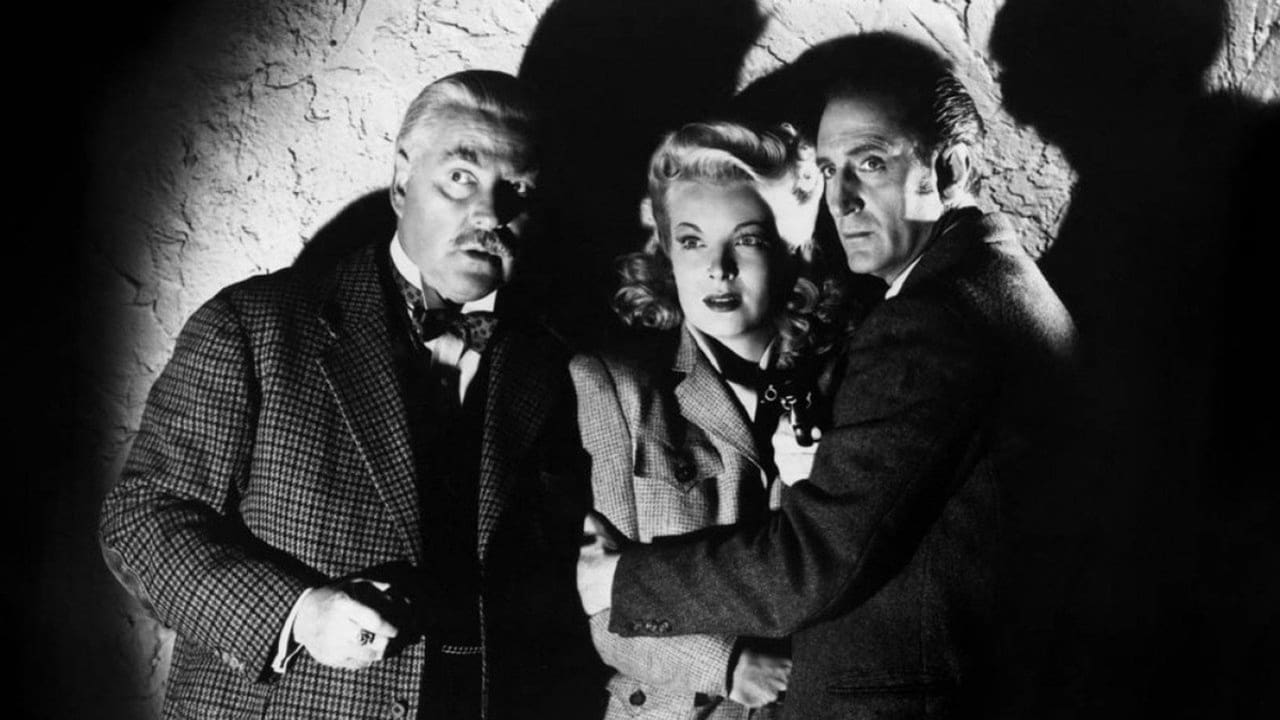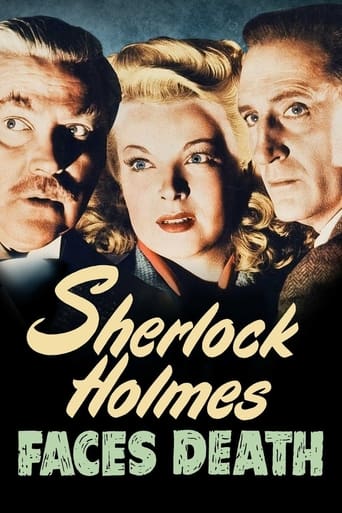

Very well executed
... View MoreI gave it a 7.5 out of 10
... View MoreBetter Late Then Never
... View MoreEach character in this movie — down to the smallest one — is an individual rather than a type, prone to spontaneous changes of mood and sometimes amusing outbursts of pettiness or ill humor.
... View MoreIf memory serves me correctly, I remember seeing "Sherlock Holmes Faces Death" late one night whilst at home alone. I had found a rather old video recording of the film (it was that long ago) and I saw it from beginning to end. It is still one of the best of the modern Holmes films. The plot has more mystery to it than others and the setting is ideal. Basil Rathbone gives another great performance as the Baker Street sleuth and this was before the actor began to grow tired of the character. There are a few murders naturally but there isn't any physically repellent detail. Dennis Hoey is a welcome addition to the cast as Inspector Lestrade. The film has a strong atmosphere as various incidents occur at Musgrave Manor. Although, it is meant to be linked to the short story "The Musgrave Ritual," "Sherlock Holmes Faces Death" isn't an adaptation as such but the film does include a few elements of the story. Watch this one and enjoy.
... View MoreAfter Universal had 'used' Sherlock Holmes and Dr. Watson in three consecutive films as an audience magnet for their wartime flag wavers (and with increasingly poor box office results), the master sleuth finally is back in his 'natural' crime element; in contemporary England this time (no more Victorian nostalgia as in the first two movies with Basil Rathbone produced by 20th Century-Fox), but still in a rather creepy atmosphere: an old manor in Northumberland, which has been turned into a rest home for shell-shocked soldiers - and when the daughter of the house falls in love with one of them (and an American on top of it all!), her brothers clearly object to her marrying him; and are both murdered within a few days...This movie really's got the 'creepy old house' feeling about it, Holmes investigates again with his usual methods; and there isn't even any Moriarty involved - so this is a real good, clean, suspenseful and clever whodunit, which keeps the watchful viewer's eye and mind busy constantly if he wants to guess the culprit in the end before Holmes catches him in an old dark vault underneath the building - or is HE the one who's caught?? Very entertaining, well played and directed, a real enjoyment for classic whodunit fans!
... View MorePerpetually battered by violent storms, the impossibly creepy Musgrave Manor is an unlikely place to find a convalescent home for WWII soldiers suffering from post-traumatic stress, but it's where we find Dr. Watson (Nigel Bruce) doing his bit for the war effort by helping the psychologically scarred recover from their battle fatigue. With the answer to a centuries-old family secret laying hidden in its dusty cellar, a prize worth millions in the wrong hands, the manor is also a prime location for murder, meaning that it isn't long before Watson is joined by his old pal Holmes (Basil Rathbone).Faces Death isn't one of the strongest of the Rathbone/Bruce Holmes series, lacking a truly challenging mystery for the great detective (the chess-based clues hidden in an ancient family rhyme being far too easy to solve for a brainiac like Holmes). The film also suffers from some irritatingly farcical antics from Scotland Yard's inept Inspector Lestrade and a somewhat out-of-place optimistic rant from Holmes designed to stir patriotism and raise wartime morale, but which these days seems depressingly poignant considering the current sad state of the country (as I type, England is licking its wounds after four days of mindless rioting in its major cities).Thankfully the film compensates for its sillier moments, less than ingenious plot, and Holmes' misguided positivity about England's future with plenty of atmosphere and lots of overtly Gothic trappings—who doesn't love tried and trusted murder/mystery elements such as a creepy manor replete with secret passageways, a pair of sinister housekeepers, a clock that strikes thirteen, and an assortment of dead bodies popping up all over?
... View MoreThe opening world turning and the Universal anthem playing and then the foggy cut to Basil Rathbone and Nigel Bruce as the great Sherlock Holmes and his trusty sidekick Watson staring at us telling us that yet another one of their adventures lies before us always sent shivers of joy down my spine and engendered the greatest anticipation when I was young. These films hold up remarkably well considering,well, everything. The stories are not always the best, the scripts sometimes make too many assumptions about what they feel the audience knows or should know. The acting is very decent but like the script and direction - very formulaic and predictable. But somehow all of it works and we have little screen gems to be viewed again and again. Director Roy William Neill does yet again a fine,workmanlike job in this tale of Dr. Watson working in a convalescent home when murder and the the Musgrave Ritual collide. Though based on the short story by Arthur Conan Doyle, the screenwriter takes several liberties here. Firstly, we are in the present time rather than Victorian England. After the first two films in the Rathbone-Bruce series, Universal(when they took the series over from Twentieth Century Fox) changed the venue for cost reasons. They also had Holmes as a fighter against Nazism and such. This sixth film in the series makes a dramatic departure from that and goes back to the mystery roots delved into in the first two films. Wisely done. The story here concerns a ritual and people dying when the clock chimes thirteen bells. The real heart of these films is the performances of Rathbone and Bruce. they are not great. There is no pathos. No great acting scenes. But each man imbues his character with warmth and solidity that breeds confidence in what they are doing. Rathbone seems so earnest at times yet always has a way with words and a clever phrase. Bruce embodies the almost cartoonish buffoon with a heart of gold and loyal to the core. Character actors of great ability surround them. Dennis Hoey is always fun as Inspector Lestrade and his wit fencing with Watson is great fun. This film also has a gem of a performance by Halliwell Hobbes as Brunton the butler. He is comic perfection in his scenes particularly in his drunken one. Look for Gunsmoke's Milburn Stone(Doc) as Capatain Vickery. Like all the later Holmes pictures by Universal during WWII - look for the heavy-handed(No argument here as it being a necessary one)message delivered between Holmes and Watson. This is good stuff.
... View More